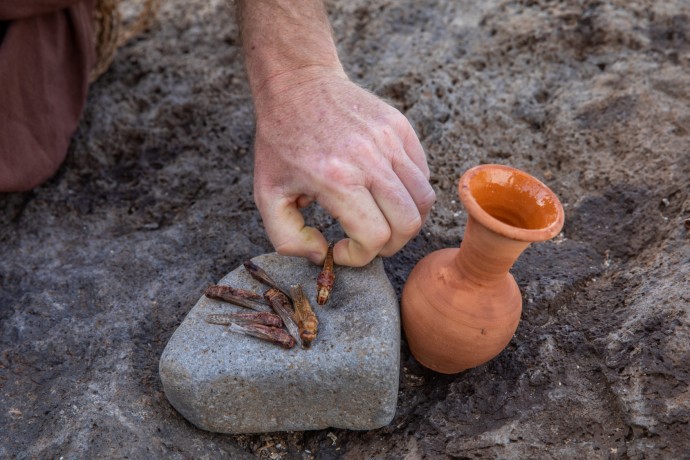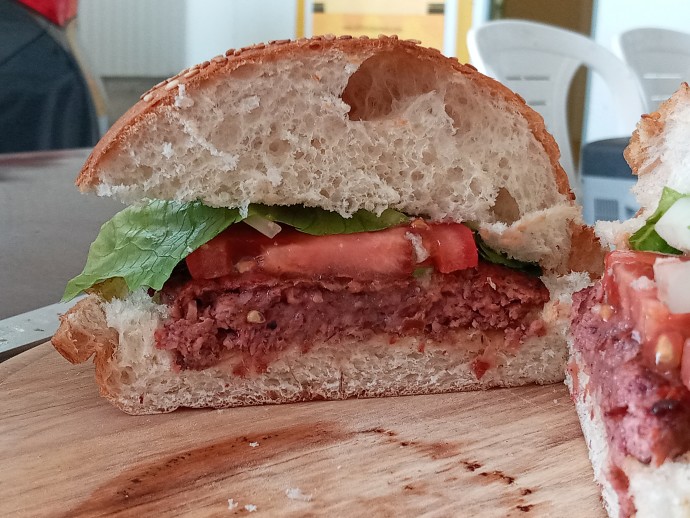Locusts were sent as a plague in Egypt in order to convince Pharoah to free the Israelite slaves, according to Exodus 10:12-15. But locusts are not only a nasty pestilence. Although most insects are forbidden to be consumed, the Bible explicitly permits locusts to be eaten (Leviticus 11:22).
Christian scripture indicates that John the Baptist survived on “locusts and wild honey” (Mark 1:6 and Matthew 3:4) and locusts are also permissible food (halal) for Muslims, according to the Koran.

Noting these biblical traditions, Dror Tamir, co-founder and CEO of Israel-based Hargol FoodTech, developed a locust-based Biblical Protein energy bar (biblicalprotein.com) and has already sold over 10,000 of them.
Tamir was raised on a kibbutz in northern Israel. In the 1950s, swarms of locusts caused extensive damage across Israel. Tamir recalled his grandparents telling stories of how most farmers took pots and ladles into the fields to try to scare away the locusts and prevent them from destroying their crops.
By contrast, the Jews from Yemen and Morocco, recognizing a free and kosher protein source, collected the locusts and ate them.
These vivid stories stayed with Tamir as he developed his career as a serial nutritional entrepreneur.
Over the past seven years, Tamir and his colleagues have been developing protein-based foods made from locusts. Their current line includes protein powders and gummies made from dried and ground locusts. In the future, they are planning to release sausages, burgers, bread, pasta, cookies and crackers, all made with locust protein powder.
Biblical Protein is a subsidiary of Hargol FoodTech that focuses on producing Biblical Protein energy bars, jars of whole locusts and other related products. Biblical Protein energy bars are marketed as an opportunity for Christians to experience the diet of John the Baptist.
Originally encouraged to exhibit their wares at a Christian conference in Israel, the company has sold thousands of jars of whole locusts to Christians in the United States. Tamir emphasized that, despite the curiosity factor, selling whole locusts is not their primary emphasis.
The Biblical Protein energy bars, which were developed in two flavors (locust, honey and raisin and locust, honey and apples) are currently out of stock. That’s because, according to Tamir, although the entire inventory sold out, the company’s leadership wasn’t fully satisfied with the production quality. They are currently searching for another producer in the US.
Additionally, they are also on the lookout for a Christian distribution partner for their Biblical Protein line. Tamir related that there has been “very high interest in the product and we need to work with someone who is an expert in the Christian market.”
Tamir and his team are well-aware of the challenge of overcoming what they call “the yuck factor” involved in selling locusts to consumers.
“In Western Europe and the US, consumers are no longer used to eating insects,” he said.
However, in other parts of the world, “two billion people consume grasshoppers as part of their diet. The developed world moved away from insects. In order to change the perception, we do not show you the whole animal,” he said.

What about the taste?
Tamir called the basic flavor of locusts “umami” (savory), similar to pecans, coffee, chocolate and mushrooms. He emphasized that “in the finished product, like gummies or the chocolate protein shake, you will not be able to tell that there are grasshoppers inside.”
According to Tamir, there are 10,000 species of grasshoppers around the world and 14 species of locusts. All locusts are grasshoppers but not all grasshoppers are locusts.
The powder that forms the basis of the line of Hargol products is rich in nutrients. In addition to containing 72% whole protein, the powder is a source of Omega-3, Omega-6, Omega-9, iron, zinc, folic acid, calcium and other vitamins and minerals.
By drying and grinding the locusts they cultivate, Hargol’s goal is to produce an alternative protein that can feed the entire world, one that is healthier and more sustainable than meat or even vegetable sources of protein. Their production methods help reduce the company’s ecological footprint and their products are largely unprocessed, especially when compared to whey and soy.
Hargol products have kosher supervision, which allows them to cooperate with other food producers in Israel. They already have a distributor in Indonesia where close to 25 million Christians live alongside more than 200 million Muslims. The company is also developing a relationship with a partner in Saudi Arabia, using a United Arab Emirates middleman for political reasons.
Tamir called locusts “nature’s most efficient protein source. No one else before could grow locusts on a commercial scale.”
He cited a 2013 United Nations report that called the need for someone to develop the technology to grow locusts commercially “crucial." Until Hargol mastered the process, the only source of locusts was collecting them in the wild during the four weeks a year when they swarm.
Tamir reported that, “hundreds of start-ups tried” to make locus cultivation profitable, but before Hargol “no one was successful. I gathered a team of experts and we worked for six years to develop the technology.”

Hargol has only been selling consumable locust-based food products for a year and their efforts to develop the technology and the quality of their products continues.
“We are continuously working on improving the percentage of protein,” he explained.
“When we look at the way we eat, we need to become more responsible. We need to understand the impact of our diet on the planet and on our health. This is a Biblical story and also the story of the future,” Tamir concluded.
